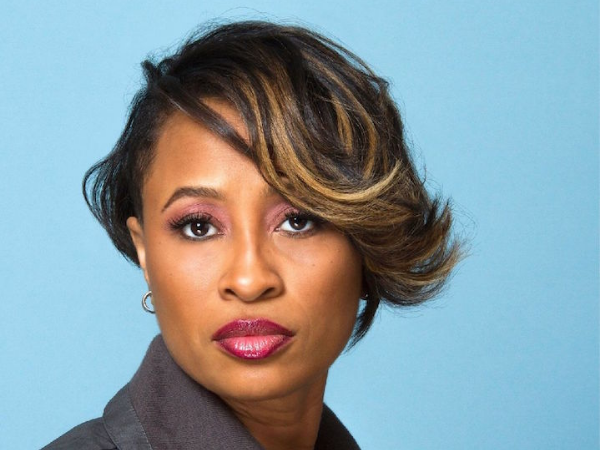Any new parent faces an array of challenges. For women of color, parenthood presents added layers of challenges that are a result of racism in our society, in our healthcare system, and in our policies and laws. CDC data paints a clear picture of the disparities between black and white breastfeeding rates: while 84% of white mothers ever breastfeed, only 66% of black mothers do so. The Black Mothers’ Breastfeeding Association, based in Detroit, MI, works to reduce racial disparities in breastfeeding success for black families through direct service, education, and advocacy. I spoke with Kiddada Green, BMBFA’s Founding Executive Director.
Kate: What was your journey to founding BMBFA?
Kiddada: The birth of my first baby, my daughter, was the impetus for BMBFA. I founded the organization when she was an infant and I was on maternity leave, which was actually just sick time I had saved up. I thought because I had six weeks of leave time saved, that it was a good thing and I was lucky. Back then, I didn’t have a full understanding of the structures in place. But now of course I question why somebody should have to use their sick time to take off of work. If I didn’t have that time off, I’m not sure how I would have managed. But I decided to make a sacrifice for my child, and stayed home with her for nine months. During that time in 2007 is when I, along with my mom and my aunt, founded Black Mothers Breastfeeding Association. I loved my breastfeeding experience. I knew I had friends and family and folks in my community who would benefit from breastfeeding. And with a new baby you need adult interaction as well. The motivating factor for this was definitely my love for black people, and the need for that community.
Kate: What is the main role of BMBFA in your community?
Kiddada: We started with lots of ideas but our flagship work is Black Mothers Breastfeeding Club. Back when we started, we leveraged social media, which was brand new back then. We used Cafe Mom, which was a place where mothers could go into chat rooms. We would have meetings in Cafe Mom. Eventually, we moved to a more social, in-person environment, which became Black Mothers Breastfeeding Club. What’s interesting is that we started out online, and then moved to in-person. We did that uninterrupted until COVID. Now we’re back online, so things have moved full circle.
Kate: What is the importance of Black Mothers Breastfeeding Club?
Kiddada: The physical interaction, the way that black people commune over food, and just talking to another is a big part of our culture. We hope to transition back to the in-person club but also maintain our online community. There’s value in both. I’m working on a mobile app which will help us collect information on our families and facilitate online video meetings. Everything we need will be right there on the app, including scheduling and collecting information. Our Black Mothers Breastfeeding Club is in the Detroit area. We’ve run it successfully for well over a decade now. We’ve also licensed with two agencies who have replicated our model. Folks were always interested in asking how we did the support group. They wanted to know what makes it work so well and how we get such good attendance. I started listening to people who led support groups that didn’t work well. From there I was able to elicit and codify what has made us successful. So we created the model for others to replicate.
Kate: Can you talk about some of the barriers that Black mothers face with breastfeeding?
Kiddada: There’s no one answer, and I don’t want to oversimplify it. There are definitely systemic issues that have existed for hundreds of years in regards to black women and their parenting experience. One huge thing that I will say is, of course there are institutional barriers with hospitals and the support black women receive there. But there are also other institutional barriers that exist as far as policies, going back to the fact that black women have to return to work postpartum earlier than our white counterparts. That not only impacts how long to breastfeed but also if you ever plan to breastfeed. Because if you know you have to go to work in two weeks, or six weeks, how long does it actually take to establish a breastfeeding relationship and get going? That’s compromised from the onset. There are policies that can help us, and paid parental leave is one of them. Hospital policies that are supportive of the breastfeeding experience are another. Those are two important things that have a direct impact.
Kate: I can’t imagine COVID has helped any of this.
Kiddada: Absolutely not. The separation of mother and baby at birth was a major issue and went on for a long time. Things have gotten better, but now limiting who can be present at birth is challenging, particularly for our community based doulas. We have two community-based doulas on our staff and offer trainings for others. But if only one person is allowed to be present at birth, then where does that leave the doula? There are things that we can improve on that are impacting birth and breastfeeding for black people.
Kate: Are there any issues that don’t get much attention, but should?
Kiddada: I would go back to the separation and baby in hospitals and babies. While it’s being exacerbated now, it’s something that black families have dealt with for years. If you go back to when black people were enslaved, there was the lack of being able to make your own decisions about your child, your birth, and how you were going to feed your baby. Moving forward, it was about the nursery and who is able to go in, and taking kids from black family’s homes as foster children. The things that are happening with COVID aren’t new issues for us. There have been advocates in this space doing this work pre-Covid.
Kate: What are you most proud of in this line of work?
Kiddada: What makes me happy is when we have a return family to our Breastfeeding Club. That tells me that they feel welcomed, they feel loved, importantc and valued. Those are some things you don’t necessarily get in the world as a black parent. So I’m always excited when we have our mothers return with their second or third child.
Learn more about BMBFA and make a donation.


